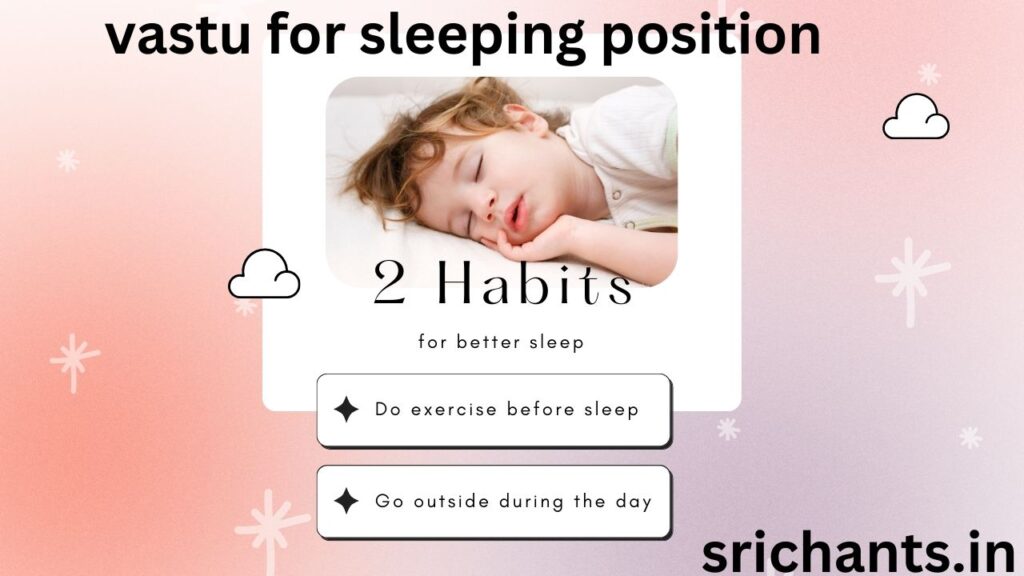Best direction of sleep : Vastu for sleeping position
Introduction
Although it is essential for our overall health and well-being to obtain a decent night’s sleep, numerous individuals encounter difficulties in optimizing their sleep environment. Although temperature, lighting, and noise levels are well-known sleep disruptors, the quality and duration of our slumber can also be significantly influenced by the often-overlooked factor of sleeping orientation.
This exhaustive guide will reveal the unexpected advantages of aligning your sleep with the Earth’s natural magnetic fields, drawing on the ancient wisdom of Eastern philosophies such as Feng Shui and Vastu Shastra, as well as contemporary scientific research. The direction your head faces while you drift off could be the missing element in your quest for restorative, rejuvenating sleep, from improved cardiovascular health to enhanced cognitive function.
The significance of sleeping direction: insights from eastern traditions
Balancing the Flow of Chi: Feng Shui
Feng Shui, a centuries-old practice that originated in China, underscores the significance of ensuring that our living spaces, including the bedroom, are in harmony with the natural flow of energy, which is referred to as “Chi” or “Qi.” The purity of this life-giving force within our personal environment can be significantly influenced by the direction in which we position our bed, according to Feng Shui principles.
The optimal circulation of Chi is believed to be facilitated by lying with your head facing south, as this direction is believed to be in harmony with the Earth’s electromagnetic field, according to Feng Shui experts. Aligning the magnetic energy of your body with that of the planet can unleash a plethora of benefits, including improved sleep quality and improved overall health and well-being.
Vastu Shastra: Utilizing the Influence of Magnetic Alignment
Vastu Shastra, an ancient Indian architectural tradition, places a comparable emphasis on the significance of spatial orientation and its influence on human health and pleasure. Vastu Shastra, like Feng Shui, asserts that the human body, like the Earth, has its own north and south poles, which makes us susceptible to the magnetic fields of the planet.
In accordance with the principles of Vastu Shastra, sleeping with your head positioned toward the south creates a state of balance and harmony by allowing your body’s natural polarity to align with that of the Earth. In contrast, sleeping with one’s head facing north is considered detrimental, as it disrupts the body’s natural magnetic alignment and can result in a variety of health problems, such as high blood pressure, migraines, and sleep disorders.

The Scientific Basis of Sleeping Direction: An Examination of the Evidence
Modern scientific research has also begun to uncover the tangible physiological and neurological benefits of aligning our sleep patterns with the Earth’s magnetic fields, while the ancient wisdom of Eastern philosophies provides a compelling foundation for the importance of sleeping direction.
Enhanced Sleep Quality and Duration
A 2019 study published in the journal Sleep Medicine discovered that participants who slept in a north-south orientation experienced substantial changes in their brain wave patterns, including an increase in delta, theta, and alpha frequencies. These frequencies are all associated with deeper, more restorative sleep. Conversely, individuals who slept in an east-west direction exhibited lower overall sleep duration and more disrupted sleep patterns.
Advantages of Cardiovascular Health
Expanding upon these discoveries, a 2022 study published in Global Advances in Health and Medicine demonstrated that sleeping with one’s head facing south is associated with decreased cholesterol levels and lower blood pressure. It is possible that the magnetic alignment of the body during sleep may have a direct impact on cardiovascular health, potentially reducing the risk of hypertension and other heart-related conditions.
Harmony with the Natural World
Research has demonstrated that other animals, including cattle and deer, also naturally align their bodies in this direction when reclining or grazing, in addition to humans, who exhibit a preference for a north-south sleeping orientation. This observation further supports the notion that our bodies are inherently attuned to the magnetic fields of the Earth and that coordinating our sleep with this natural phenomenon can have significant physiological benefits.

Exploring the Possibilities of Optimal Sleeping Directions
The Advantages of Sleeping Southward
The consensus among experts is unequivocal: the optimal direction for obtaining better sleep, improved cardiovascular health, and overall well-being is to sleep with your head facing south, as evidenced by a wealth of evidence, both ancient and modern. This alignment enables the natural magnetic polarity of your body to synchronize with that of the Earth, resulting in a state of balance and harmony that can have a significant impact on your physical and mental health.
Investigating Alternative Paths
Although the optimal sleeping position is to have one’s head oriented toward the south, other sleeping positions may also provide advantages, albeit to a lesser extent. In accordance with Vastu Shastra, it is also permissible to slumber with one’s head facing east, as it is believed to improve memory, concentration, and overall health.
However, it is generally not recommended to slumber with your head facing the west or north. Feng Shui and Vastu Shastra both caution that these directions can disrupt the flow of positive energy, resulting in issues such as insomnia, nightmares, and an increased risk of cardiovascular problems.

Enhancing Your Sleep Environment: The Integration of Eastern Wisdom
Eastern philosophies provide a multitude of insights for establishing a sleep-promoting environment that is consistent with the principles of Feng Shui and Vastu Shastra, in addition to influencing the direction of your sleep.
Placing Your Bed in a Strategic Location
The optimal bed placement, as per Feng Shui, enables you to observe the chamber door while lying in bed, without being directly in line with it. It is believed that this “command position” can foster a sense of empowerment and control, which can lead to more restful and rejuvenating slumber.
Additionally, Feng Shui and Vastu Shastra discourage the placement of your bed beneath windows, ceiling fans, or decorative beams, as these elements are believed to disrupt the flow of positive energy and contribute to sleep disturbances.
Embracing Materials and Colors that Promote Calmness
The quality of your sleep can also be significantly influenced by the color scheme of your bedroom. Incorporating neutral tones such as beige, tan, and cream, as well as nature-inspired tints like green and blue, is recommended by Feng Shui experts. These colors have been demonstrated to promote relaxation and tranquility.
Additionally, the energetic equilibrium of your sleeping quarters may be influenced by the materials employed in your linens and furnishings. The principles of ethical and sustainable design are promoted by Feng Shui and Vastu Shastra, which can have a beneficial effect on your overall well-being. They also advocate for the use of high-quality, non-toxic materials.
Electronics Decluttering and Elimination
The significance of preserving a slumber environment that is free of electronics and clutter is underscored by both Feng Shui and Vastu Shastra. The flow of positive energy is believed to be disrupted and restlessness and poor sleep quality are contributed to by excess clutter and the presence of electronic devices, such as TVs, computers, and smartphones.
It is possible to establish a more tranquil and sleep-promoting environment that is consistent with the tenets of these ancient Eastern traditions by eliminating superfluous items from your bedroom and prohibiting the use of electronic devices.

Investigating Alternative Eastern Methods for Improved Sleep
In addition to the valuable insights on sleeping direction and bedroom design, Eastern medicine and spiritual practices provide a variety of additional techniques and remedies that can further improve your overall well-being and quality of sleep.
Herbal Remedies of Traditional Chinese Medicine
Traditional Chinese medicine (TCM) has historically employed a diverse array of herbal concoctions to resolve sleep-related concerns. The potential to enhance the quality and duration of sleep has been investigated in the context of conventional medications, with compounds such as Guizhi Gancao Longgu Muli, Shumian, and Wuling being investigated.
It is crucial to consult with a qualified healthcare provider prior to incorporating these herbal remedies into your routine, as they may interact with specific medications or have potential adverse effects. Despite the fact that these remedies may offer promising results, it is crucial to do so.
Ashwagandha: An Ayurvedic Approach
Ayurveda, the ancient Indian system of holistic medicine, also provides valuable insights into enhancing the quality of sleep. Ashwagandha, a well-known Ayurvedic herb, has been investigated for its capacity to improve the quality of sleep, particularly in those who do not have clinically diagnosed insomnia.
Like traditional Chinese herbal remedies, it is crucial to consult with a healthcare professional before utilizing Ashwagandha, as it may interact with specific medications or have contraindications for specific health conditions.
Mind-Body Practices
: Qi Gong and Tai Chi Eastern traditions also underscore the significance of mind-body practices, including Tai Chi and Qi Gong, in enhancing overall well-being and improving sleep. These gentle exercises, which incorporate meditative elements and physical movement, have been associated with enhanced sleep quality, particularly in older individuals.
By integrating these mind-body practices into your daily routine, you can leverage the power of the mind-body connection to accomplish more restorative and rejuvenating sleep.

Conclusion, the adoption of Eastern wisdom can lead to improved sleep.
The ancient traditions of Feng Shui, Vastu Shastra, and other Eastern philosophies, as we have discovered, provide a multitude of insights into the significance of sleeping direction and its influence on our physical, mental, and emotional well-being. By adopting the holistic principles of these ancient practices and aligning our sleep patterns with the natural rhythms of the Earth, we can achieve a new level of overall health and sleep quality.
The wisdom of the East offers a comprehensive roadmap for establishing a sleep-promoting environment that is tailored to your individual needs and preferences, whether it involves adjusting the direction of your bed, incorporating calming colors and materials into your bedroom, or investigating the advantages of traditional herbal remedies and mind-body practices.
As you begin your journey to improve your sleep, it is important to consider the direction your head is facing and to allow the enduring wisdom of Eastern traditions to guide you toward a more restorative and rejuvenating slumber. Sweet fantasies are in store!
#sleep #sleeping #direction #east #bestdirection #sleepingdirection #sleepingvastu

